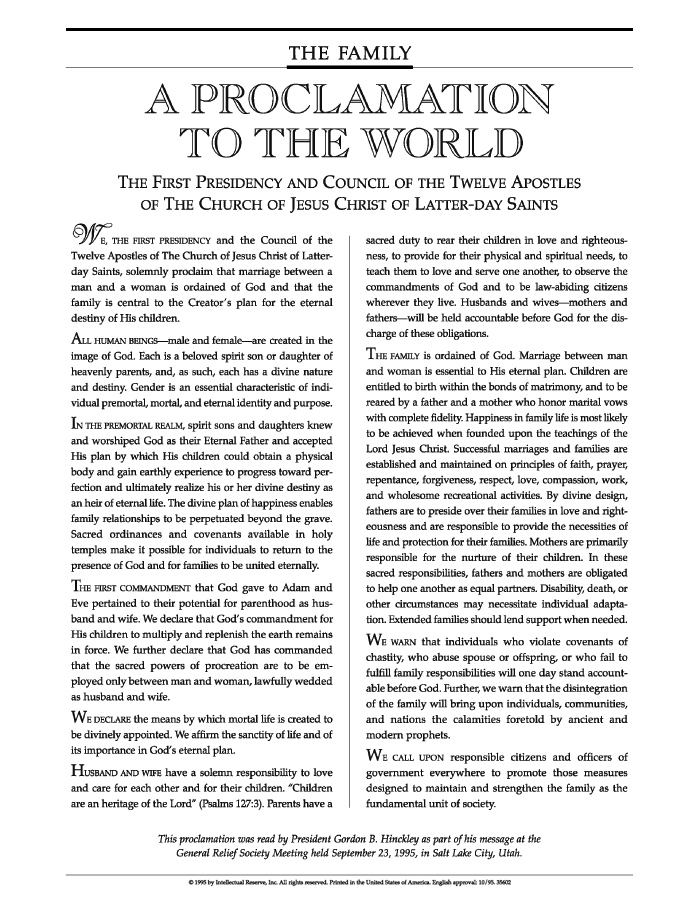And I’ll bet she never knew even a single Mormon. Based on Sally Quinn’s question to Mormon historian and Columbia history professor emeritus Richard Bushman, it’s a safe bet Sally hasn’t. Regardless, she’s a rather credulous journalist practicing a supposedly cynical and skeptical profession if her questions and musings on Mormonism are any indication.
In a Pew Forum on Religion and Public Life almost four years ago titled Mormonism and Politics: Are They Compatible? she first asks Bushman–a rather famous Mormon historian–if he’s a Mormon. When he responds yes, she responds, “I’m sure you have heard of Martha Beck.” Again, the answer is yes. After reviewing briefly who Beck is, for the benefit of people in attendance who may not have heard of her, and after mentioning Beck’s then-recent book Leaving the Saints,”** Quinn says,
[Beck] went back [to Brigham Young University] and had an absolutely horrendous experience. She wrote another book called Leaving the Saints. She finally did leave the church. In her book, she revealed that her father had sexually abused her when she was a child. She talked about how she went back, and she had this Ph.D. from Harvard, and she was trying to fit in and bring her child into it, but she went to work as a teacher at Brigham Young University and found that the church was very unaccepting, very dogmatic, and that she couldn’t teach what she wanted to teach. Because she spoke out against some of the beliefs, she was in effect banned or banished from the church, she and her husband. Finally, they actually had to move away to Arizona because it became so untenable a situation.
And I think that reading a book like that – I have no knowledge of Mormons at all, really, but reading Martha’s books, I was absolutely appalled at some of the things that I read about the Mormon Church and the closed-mindedness and demands on people that they adhere to the beliefs or they will get banished.
So I think that kind of story is where a lot of these perceptions come from. I don’t know whether every word she wrote was true or not. It sounded pretty true. I think that sets the stage for my next question, which is, How Mormon is Mitt Romney? I mean, is he someone who would adhere to all of the beliefs of the church? In Martha Beck’s case, when she went against church policy, she was banned or banished. Would that happen if Romney disagreed with the church, and particularly their positions on women? (all bolded emphasis supplied)
These statements from a journalist and co-founder of the Washington Post’s On Faith “feature,” are revealing, especially in the context the of On Faith’s mission statement, a statement written by Quinn and co-founder Jon Meacham:
Religion is the most pervasive yet least understood topic in global life.
Maybe even at The Washington Post.
From the caves of the Afghan-Pakistan border to the cul-de-sacs of the American Sunbelt, faith shapes and suffuses the way billions of people-Christian, Muslim, Jewish, Hindu, Buddhist, and nonbelievers-think and act, vote and fight, love and, tragically, hate. It is the most ancient of forces. As Homer said, “All men need the gods.” Even the most ferocious atheists find themselves doing intellectual battle on a field defined by forces of the faithful.
Seems as though Quinn and Meacham have pretty much staked out the religious terrain, which, according to them, runs from caves to cul-de-sacs. That pretty much leaves out L.A., New York City, D.C., Paris, London, and any other place where sophisticates gather to help the rest of us “understand” the “least understood topic in global life,” especially, it appears, if that topic is Mormonism.
And so, in a time of extremism — for extremism is to the 21st century what totalitarianism was to the 20th — how can people engage in a conversation about faith and its implications in a way that sheds light rather than generates heat?
And Quinn’s very uninformed opinion of Beck’s book? What kind of light does it shed?
At The Washington Post and Newsweek, we believe the first step is conversation-intelligent, informed, eclectic, respectful conversation-among specialists and generalists who devote a good part of their lives to understanding and delineating religion’s influence on the life of the world. The point of our new online religion feature is to provide a forum for such sane and spirited talk, drawing on a remarkable panel of distinguished figures from the academy, the faith traditions, and journalism. Members of the group will weigh in on a question posed at least once a week, perhaps sometimes more often, depending on the flow of the news. We encourage readers to join the conversation by commenting on what our panelists have to say, offering their own opinions and suggesting topics for future discussions.
From the nature of evil to religious reformation, from the morality of fetal stem-cell research to the history of scripture, from how to raise kids in multi-faith households to the place of gays in traditional churches — of the asking of questions, to paraphrase Ecclesiastes, there shall be no end. We think that the online world, with its limitless space, offers us a unique opportunity to carry on a fruitful, intriguing, and above all constructive conversation about the things that matter most.
Blah, blah, blah, blah. If Quinn’s knowledge of Mormonism says anything about her knowledge of religion in general, this “feature” is in trouble. If Quinn’s lack of research before she participated in that Pew Forum on Mormonism is any indication of her work ethic and research skills, I have to wonder about The Washington Post, given her station and tenure there. If her credulity with regards to Beck’s book is any indication, she’s not skeptical enough to be a good journalist.
*Quoted by Israel Shenker, “Critics Here Focus on Films As Language Conference Opens,” The New York Times (1972-12-28).
**By the way, if you’re interested in how horrible Beck’s book is, go here. It’s really, really, really bad.

